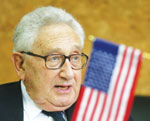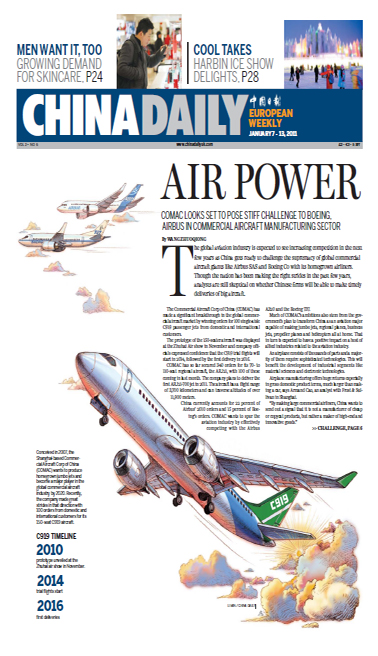ABB's Hogan eyes green revolution
Updated: 2010-11-26 07:57
By Li Fangfang (China Daily)
SHANGHAI - As the key member of International Business Leaders' Advisory Council for the Mayor of Shanghai, Joseph Hogan needs to have a deep understanding of both the Chinese market and Shanghai city. Well, he certainly does know how to do business in China and has a clear vision of the world's fastest growing economy.
It's the third time Hogan has participated in the annual council meeting with Shanghai's mayor. Moreover, he thinks that being an adviser to a Chinese mayor also helps in his other role, as president and chief executive officer of the industrial product provider ABB Group, providing greater accesses to his company's most important market.
During his short stay in China, Hogan shared his views with China Daily about ABB's success in the country as well as his philosophy of doing business in this unique market.
What makes ABB stand out against other multinational companies in China?
I would say that competition is very strong in China and that's good for the country. The stronger the competition, the better companies perform. It's the world's most competitive market.
We have invested $1.2 billion in China over the last 10 years or so. Every year ABB invests between $100 and $150 million in the Chinese market. It's been a very consistent investment profile over the years, and so we'll continue to do that.
ABB has a century of history in the market, from the time China had just begun to develop, so we feel like we're part of the growth pace, part of the fabric in that sense.
ABB often designs and manufactures our own products here for the domestic marketplace. We call that our "In China, for China" strategy, and have been able to evolve that over the years.
China has become a very important market. You have experience in other countries, but China is unique. Do you have a special strategy for the Chinese market?
Yes, China is unique. China has its own demands and its own tastes. You cannot dictate that by Western norms. You have to understand the Chinese marketplace, the people, what the domestic industry needs. And you should do business in China with respect.
What I learned in China is that things move three times faster than in the rest of the world. So you have to develop as much as you can internally because the rhythm and needs all have to be felt by your team, as to what the Chinese customers and people really want. That is why the "In China, For China" strategy is so important, because it's such a unique society in a sense.
China is obviously an area of investment that is extremely important for us. To adapt to the brisk rhythm, the long-term, middle-term and short-term strategic pieces all become important here.
As a green technology leader, what's your view on the business opportunities in the energy efficiency sector of the Chinese market?
One of the biggest things we promote in energy efficiency is the use of Drive Technology (often known simply as Drive), on electrical motors. Regarding industrial production, almost 50 percent of industrial production energy will be consumed by electrical motors. Electrical motors, without Drive, will run at 100 percent speed, even when they don't have to. When you apply Drive Technology to it, you can modify the energy usage of that motor by the need for it in some way. It promises energy savings of between 10 and 40 percent, depending on what the application is. So we have a very strong Drive business here in China: low voltage Drives and medium voltage Drives.
When I came into this industry three years ago, I was stunned. I always thought solar power, hydro power, or wind power would be the solution. I had no idea that energy efficiency would be such a big part of the savings. If you look at the global climate change initiative out of Copenhagen, and you look at the goal of carbon dioxide reduction by 2030, 55 percent of that reduction has to come from energy efficiency, not from wind or solar. And I think China has a huge opportunity to reap a lot of benefits from an energy-efficiency focus on electricity.
We talked a lot about how ABB has helped over the years by incorporating energy efficiency. Can you tell us more about your efforts to improve energy efficiency during your internal manufacturing processes?
We have goals of reducing energy consumption by close to 5 percent per year per plant for ABB. So we do constant audits of understanding what the energy uses are in a facility, using the manufacturing facilities to see how we can reduce energy.
But it is not just energy. It's waste, too. So you can look at reducing energy, but also the amount of waste. We're trying to use recyclable packaging as much as we can when we move things in and out of different places. It is part of the culture, as it should be. And it's about trying to have as little impact as possible, for example environmental impact on your surroundings.
And it's not just in our industrial facilities, but also our offices and administrative spaces all try to use as many sophisticated controls to reduce energy use.
Paper's Digest

Fresh start
China has an enormous stake in the stability and prosperity of the EU, the largest market for its exports.
Lion's share
Tuning into FM
Found in translation
Specials

On the rise
China could become the world's largest market for helicopters in the next two decades.

General Practice
Country doctors work in trying conditions to bring care to people in the remotest of regions.

Reading Pleasure
Whatever genre you fancy, these English-language book titles of 2011 are sure to delight.
